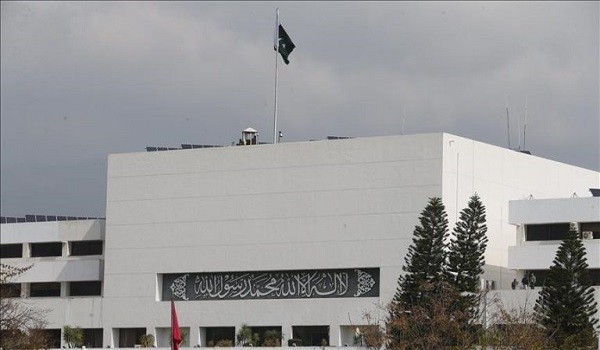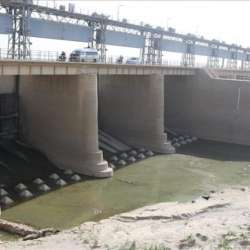Constitutional changes have reduced powers of the Supreme Court and modified the process of appointing top judges
- Ruling coalition contends changes were necessary to regulate the judiciary, but critics say it is ‘part of power politics’
Aamir Latif
Karachi, Sindh, Pakistan
Constitutional changes approved by Pakistan’s Parliament this week have further strained the country’s political atmosphere, with critics accusing the government of undermining the independence of the judiciary.
Prime Minister Shehbaz Sharif’s ruling coalition maintains that the 22-point Constitutional Package is aimed at regulating the country’s judicial system.
The 26th Constitutional Amendment Bill 2024 passed with a two-thirds majority from both the National Assembly and Senate, as lawmakers, oddly, worked through a Sunday night.
In total, 65 senators and 225 assembly members voted in favor, enough for the majority needed for changes to the Constitution.
The senators included a man and a woman from the province of Balochistan who voted against party lines. Their party says the man himself and the woman’s son and husband were abducted by security forces and coerced, charges the government denies.
Pakistan Tehreek-e-Insaf (PTI), the main opposition party of jailed ex-Prime Minister Imran Khan, boycotted the assembly vote and opposed the bill in the Senate.
A previous attempt in September to make the changes failed because the coalition could not muster the numbers. It was then given to a special parliamentary committee set up last month, which had members from all parties, including the PTI.

Key changes
The amendment has given the prime minister the power to appoint the next chief justice, sets the top judge’s term at three years, and has taken away the Supreme Court’s suo motu powers — the ability to take action on an issue without any request by the parties involved.
Previously, the senior-most judge of the Supreme Court would automatically become chief justice and serve until retirement at age 65.
Now a 12-member parliamentary committee will select one of the three senior-most judges and forward a recommendation to the prime minister, who will pass it on to the president.
The committee, which has proportional membership from all parties in Parliament, has to pick a candidate with two-thirds majority.
The new process has already been used to appoint Justice Yahya Afridi as the next chief justice, who will take over later this week for a three-year term.
In addition, any new Supreme Court judges will now be appointed by a judicial commission that has the chief justice, the four most senior judges, four lawmakers and a representative of the Pakistan Bar Council.
Also, instead of the chief justice, the judicial commission will now decide which judges hear which specific cases, and there is a new provision for five-member “constitutional benches” to hear political and constitutional cases.
The latter was a compromise on the initial idea of setting up a separate Constitutional Court, equivalent to the Supreme Court.
‘Part of power politics’
The government says the legislation aims to decentralize powers and create a “balance” between the Parliament and judiciary.
In a speech after the bill was passed, Prime Minister Sharif hailed the amendment as a “historical achievement” and “example of national solidarity and consensus.”
Addressing Cabinet members a day later, Sharif reiterated that it would be a “milestone” for Pakistan and “bring ease for the common man who had to suffer owing to inordinate delays in seeking justice,” according to state media.

Thanking his coalition partners and independent lawmakers who supported the move, Sharif said the legislation was the result of “tireless efforts … which also manifested a true spirit of consultation.”
That contention has been dismissed not just by opposition parties, but also watchdogs in the country and abroad, including UN human rights chief Volker Turk.
“Latest constitutional amendments — adopted hastily, without broad consultation and debate — will seriously undermine independence of the judiciary. Constitutional reforms must be in line with international human rights law,” Turk said in a statement.
Critics accuse the government of politicizing the judiciary and encroaching on its powers, while supporters of the move argue it was necessary to curb the judiciary’s “continuous involvement” in government affairs.
Political analyst Hasan Askari views it as “a part of power politics” in Pakistan, saying the government acted out of fear that the future judicial setup would become a threat to the political side.
His remarks referred to Justice Mansoor Ali Shah, the senior-most judge who would have automatically become the next chief justice if the changes were not made.
Shah drew the government’s ire after he, along with seven other top court judges, ruled in favor of PTI in July in a case related to reserved parliamentary seats, which were allotted to the ruling alliance in the aftermath of the Feb. 8 general elections.
“They have used power to secure their power,” Askari told Anadolu.
Political commentator Sajjad Mir partially agreed with his viewpoint, but said the executive was compelled to “assert” itself because of “too much” concentration of power with the judiciary.
“The top judiciary, in collusion with the military establishment, has played a role against the democratic governments. That has resulted in the repeated ouster of governments and disqualifications of several prime ministers on flimsy grounds over the past seven decades,” he told Anadolu.
“No doubt, it’s all about politics,” he said, but added that he believes the crisis was “started by the judiciary.”
There were also some indicators “from a section of judiciary that propelled the government to take preemptive measures to thwart any judicial adventure,” Mir said.
“One can object to the timing of the legislation but it has several legitimate points, mainly to address the judiciary’s gradual intrusion into the domain of other pillars of the state.”
Legal fraternity divided
Pakistan’s legal fraternity stands divided over the amendment, with opponents terming it “a blow to the judiciary,” while supporters acknowledge Parliament’s right of legislation.
“Parliament represents the 250 million people of Pakistan … What the government has done is nothing new. Before the 18th amendment (passed in 2010), judges’ appointments were made by the government. Now this amendment gives that power to the Parliament, which is the right way to go about it,” Yaseen Azad, a former president of the Supreme Court Bar Association, told Anadolu.
“I was a member of the judicial commission for four years. I am witness to how the appointment of judges was a handful of people just picking and choosing their favorites. Parliament will handle it now, with both the ruling and opposition parties getting a say.”
Denouncing the changes, Amir Nawaz Waraich, president of the Karachi Bar Association (KBA), said lawyers will launch a nationwide protest movement against what he termed “anti-judiciary legislation.”
“We recognize Parliament’s right to amend the constitution, but the manner in which this right was exercised marks a dark day in the democratic history of Pakistan,” he said in a statement.
He said the KBA will continue to monitor the situation and stands ready to offer legal assistance to “Protect the independence of the judiciary and the rights of citizens.”
 Indonesia plans to buy 200 helicopters for defense, disaster response
Indonesia plans to buy 200 helicopters for defense, disaster response
 Strategic collaboration between GCC Interconnection Authority, EPRI
Strategic collaboration between GCC Interconnection Authority, EPRI
 Youth 4 Sustainability concludes Global Mentorship Programme
Youth 4 Sustainability concludes Global Mentorship Programme
 Dubai SME collaborates with Google to empower Emirati businesses
Dubai SME collaborates with Google to empower Emirati businesses
 Dubai Future Labs’ Aysha AlShehhi wins 2025 L’Oreal-UNESCO For Women in Science Award
Dubai Future Labs’ Aysha AlShehhi wins 2025 L’Oreal-UNESCO For Women in Science Award
 5.3-magnitude earthquake strikes Mexico's Oaxaca State
5.3-magnitude earthquake strikes Mexico's Oaxaca State
 TRENDS to participate in BRIDGE Summit with AI-enhanced pavilion
TRENDS to participate in BRIDGE Summit with AI-enhanced pavilion

 Indonesia plans to buy 200 helicopters for defense, disaster response
Indonesia plans to buy 200 helicopters for defense, disaster response
 Strategic collaboration between GCC Interconnection Authority, EPRI
Strategic collaboration between GCC Interconnection Authority, EPRI
 Youth 4 Sustainability concludes Global Mentorship Programme
Youth 4 Sustainability concludes Global Mentorship Programme
 Dubai SME collaborates with Google to empower Emirati businesses
Dubai SME collaborates with Google to empower Emirati businesses
 Dubai Future Labs’ Aysha AlShehhi wins 2025 L’Oreal-UNESCO For Women in Science Award
Dubai Future Labs’ Aysha AlShehhi wins 2025 L’Oreal-UNESCO For Women in Science Award
 5.3-magnitude earthquake strikes Mexico's Oaxaca State
5.3-magnitude earthquake strikes Mexico's Oaxaca State
 TRENDS to participate in BRIDGE Summit with AI-enhanced pavilion
TRENDS to participate in BRIDGE Summit with AI-enhanced pavilion













Comments